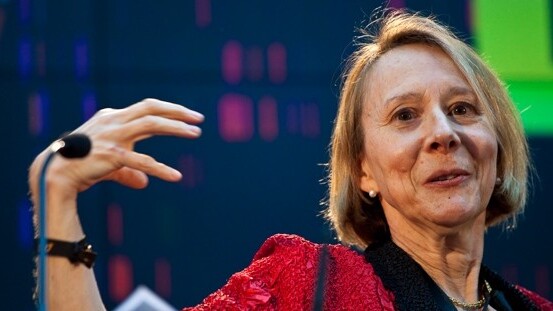
The Next Web sat down with Esther Dyson, a world leading angel investor, to learn something about her top investments and trends, mainly in eastern Europe.
Dyson, CEO of EDventure Holdings, is an active investor in a variety of start-ups around the world. Her interests include information technology, health care, private aviation, and space travel.
TNW: What changes (technology/quality of startup teams etc) have you seen in the past two decades in the Central and Eastern Europe (CEE)/Russia region?
ED: The biggest change is that there’s just much more startup activity. There are more startups, more money, more investors, more customers. There are more people who have had business experience and are now ready to start their own companies or to work with someone else’s startup. In the past, there were no role models, but over 20 years, a few pioneers have led the way for hundreds of followers.
TNW: What have been your top three investments in recent years?
ED: Yandex, 23andMe and… not sure yet! It’s hard to pick. Yandex has gone public and its success is quantifiable, whereas 23andMe is still early. 23andMe, however, has the potential to create a new market for personal genomics. And I have one health investment in Russia, combining two of my interests: Vita Portal. It’s a website that will provide personalized health information for users and ultimately help them to manage their own data.
I am also godmother to Text4Baby Russia, an SMS service for pregnant women and mothers. Also, Apiary is as one of my East European startups. I like them because they focus on APIs as meaningful semantically active objects rather than simple bundles of rights. (Note – Pavel Curda, the interviewer here, is also an investor in Apiary).
TNW: What trends do you see in e-healthcare?
ED: My top picks are all the companies in my portfolio! I see a lot of promise in services that motivate people to motivate one another to exercise, sleep more, eat healthy – and avoid health “care” as much as possible.
TNW: What are your favorite business areas (apart of heatlhcare) that you are looking at as an investor?
ED: Big data/structure of data/extraction of meaning, commercial space flight, services (mostly mobile) in emerging markets
TNW: What are the top tech trends that will change the world in the coming years, in your view?
ED: Big data, the spread of mobile in emerging markets, real-time data on everything.
TNW: You are a former journalist and Wall Street technology analyst who is a leading angel investor,entrepreneur, philanthropist. What did you like about each role?
ED: Don’t forget author of a book and backup cosmonaut! In each case, I have been learning something and usually doing something useful – explaining how things work, and somehow helping people to be more effective and efficient. That is both in the companies I have backed, and usually for the customers as well. I have nothing against entertainment or luxury, but personally I like things that are useful.
Most of what I back is about either efficiency or user empowerment. In fact, I’m really lazy – both for myself and for the world. It offends me to see anyone doing unnecessary work. But useful work – that I like! I could retire now… and perhaps I retired 20 years ago. I spend my time doing what I love. Some of it makes me money, and some of it costs money…. But I try not to do anything that I wouldn’t do for free.
TNW: What are your top three places for starting a tech/internet company in the CEE region? Why?
ED: Moscow, obviously, is at the center of the largest market, and I’m actually really interested in improving life for Russians, not just going global and selling things to the West. Aside from that, it really depends more on the people than on the location. For what it’s worth, I think there are huge opportunities in Africa and the Middle East and India.
TNW: How much time you spend online?
ED: I spend a huge amount of time online communicating directly with people in my portfolio companies and related things, and also on all the other things I do: writing, supporting nonprofits (Sunlight Foundation, Personal Genome Project, Eurasia Foundation, StopBadware.org), speaking at conferences and other meetings. I don’t spend that much time browsing the Web or hanging out in social networks.
TNW: What are your favorite social networks?
ED: I post most frequently on Flickr and Twitter. And of course I’m on Facebook and LinkedIn. I still haven’t really gotten the hang of Google’s identity management for people with corporate accounts, so I don’t use Google+ that much.
Get the TNW newsletter
Get the most important tech news in your inbox each week.




